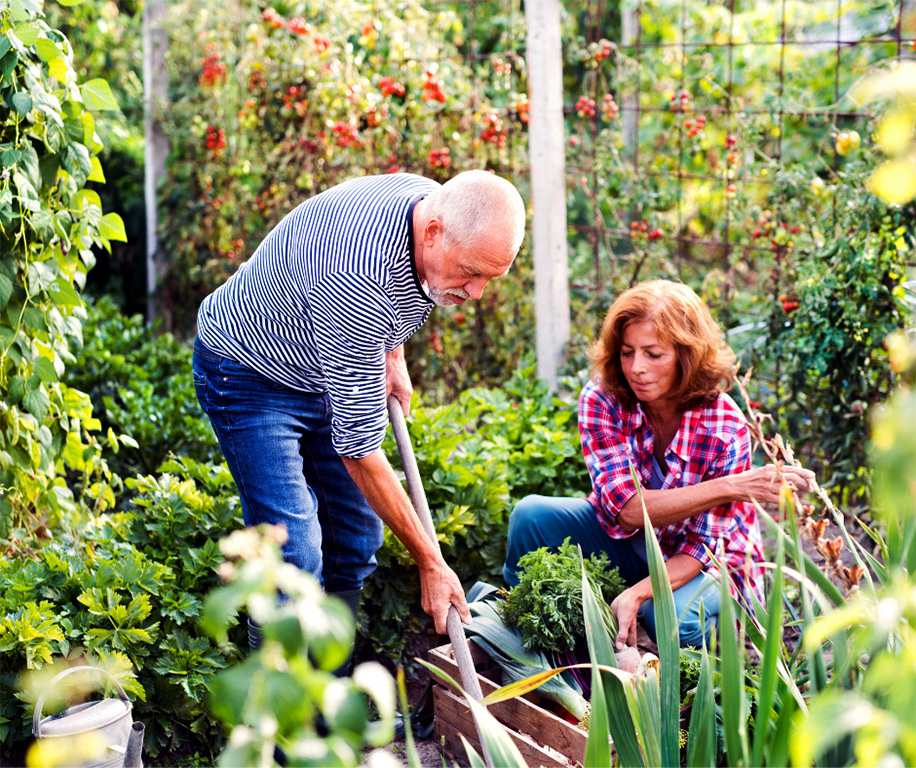

Editor’s note: Original story posted by Lisa Marshall of CU Boulder Today.
Colorado State University Associate Professor Kaigang Li and one of his Ph.D. students played key roles in research that found that community gardeners ate more fiber, got more exercise and saw decreases in stress and anxiety.
Along with Li, the study led by University of Colorado’s Jill Litt involved researchers from the Colorado School of Public Health, the CU Cancer Center, the University of South Carolina and Michigan State University. It was published in The Lancet Planetary Health.
Li, who is the director of the Assessment and Promotion of Physical Activity Lab in CSU’s Department of Health and Exercise Science, oversaw the assessment of physical activity among study participants.
Li and Jimikaye Beck Courtney, a graduate of the Ph.D. program in Human Bioenergetics in the Department of Health and Exercise Science, assisted in the training of physical activity monitoring, the development of protocol for monitoring physical activity and the collection and analysis of physical activity data.
Funded by the American Cancer Society, the first-ever, randomized, controlled trial of community gardening found that those who started gardening ate more fiber and got more physical activity—two known ways to reduce risk of cancer and chronic diseases. They also saw their levels of stress and anxiety significantly decrease.
“These findings provide concrete evidence that community gardening could play an important role in preventing cancer, chronic diseases and mental health disorders,” said Litt, a professor in the Department of Environmental Studies at CU Boulder.
“No matter where you go, people say there’s just something about gardening that makes them feel better,” said Litt. But solid science on its benefits is hard to come by. Without evidence, it’s hard to get support for new programs, she said.
Some small observational studies have found that people who garden tend to eat more fruits and vegetables and have a healthier weight. But it has been unclear whether healthier people just tend to garden, or gardening influences health.
Only three studies have applied the gold standard of scientific research, the randomized controlled trial, to the pastime. None have looked specifically at community gardening.
To fill the gap, Litt’s team recruited 291 non-gardening adults, average age of 41, from the Denver area. More than a third were Hispanic and more than half came from low-income households.
After the last spring frost, half were assigned to the community gardening group and half to a control group that was asked to wait one year to start gardening.
The gardening group received a free community garden plot, some seeds and seedlings, and an introductory gardening course through the nonprofit Denver Urban Gardens program and a study partner.
Both groups took periodic surveys about their nutritional intake and mental health, underwent body measurements and wore activity monitors.
By fall, those in the gardening group were eating, on average, 1.4 grams more fiber per day than the control group—an increase of about 7%.
The authors note that fiber exerts a profound effect on inflammatory and immune responses, influencing everything from how we metabolize food to how healthy our gut microbiome is to how susceptible we are to diabetes and certain cancers.
While doctors recommend about 25 to 38 grams of fiber per day, the average adult consumes less than 16 grams.
The gardening group also increased their physical activity levels by about 42 minutes per week. Public health agencies recommend at least 150 minutes of physical activity per week, a recommendation only a quarter of the U.S. population meets. With just two to three visits to the community garden weekly, participants met 28% of that requirement.
“Compared to more formal exercise settings, community gardening provides enjoyable social activities which can burn the same number of calories as you would at the gym with lower risk and more exposure to nature and sunlight.” Li said.
Study participants also saw their stress and anxiety levels decrease, with those who came into the study most stressed and anxious seeing the greatest reduction in mental health issues.
The study also confirmed that even novice gardeners can reap measurable health benefits of the pastime in their first season. As they have more experience and enjoy greater yields, Litt suspects such benefits will increase.
The social connection is also huge.
“Even if you come to the garden looking to grow your food on your own in a quiet place, you start to look at your neighbor’s plot and share techniques and recipes, and over time relationships bloom,” Litt said. “It’s not just about the fruits and vegetables. It’s also about being in a natural space outdoors together with others.”
The Department of Health and Exercise Science is part of the College of Health and Human Sciences.